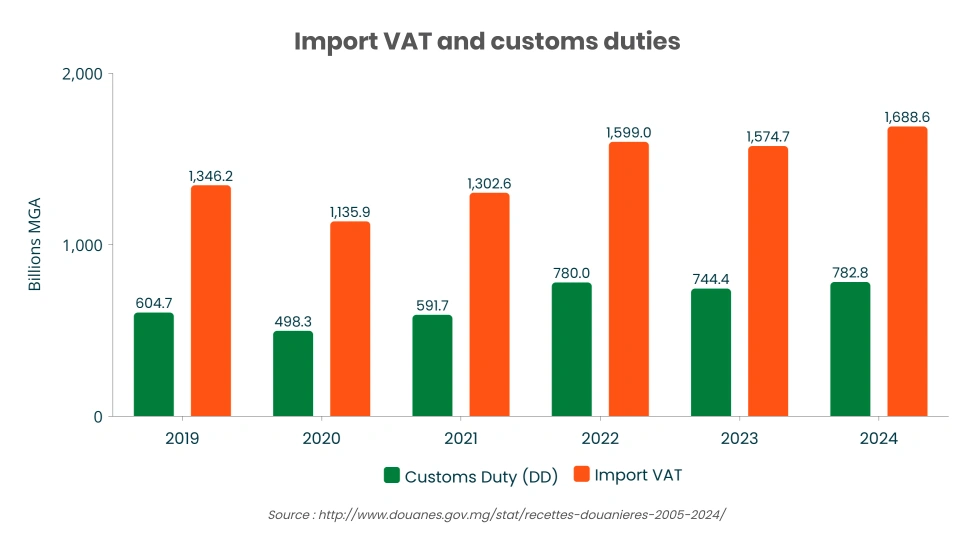Over a period of six years, Madagascar’s customs revenues have seen a steady increase. This trend reflects economic dynamics and trade exchanges as well as significant legislative adjustments. Let’s explore the main components of these revenues and the variations observed between 2019 and 2024.
Customs Revenues : major economic pillar
Malagasy customs constitute an essential source of revenue for the state, contributing about 50 % of its income. Besides their fiscal mission, the institution also ensures an economic security function and protects the national territory against external threats. This includes combating illicit products and protecting local producers from unfair competition.
Evolution of overall customs revenues
Despite economic fluctuations, total customs revenues have shown sustained growth. In 2020, this fiscal revenue recorded a 20% decrease due to the Covid-19 pandemic. Thanks to the global economic recovery, these revenues increased by 30 % in 2022. Total revenues reached 3,438.7 billion MGA (approximately 731 million USD) in 2024.
Import VAT and customs duties
Customs duties (DD) and import VAT also represent major components of customs revenues. DDs showed a fluctuating trend, amounting to 604.7 billion MGA in 2019. A notable decrease of 17.6 % occurred in 2020, followed by a gradual recovery reaching 782.8 billion MGA in 2024.
However, import VAT represents a major share of customs revenues. In 2019, this tax generated 1,346.2 billion MGA. Just like DDs, VAT slightly decreased by 15.6 % the following year. Nevertheless, continuous growth quickly compensated, reaching 1,688.6 billion MGA in 2024.
Contributions from taxes on petroleum products
Revenues from petroleum products are substantial due to their economic weight and import volume. Despite fluctuations in international prices, taxes on petroleum products (TPP) generated 263.9 billion MGA in 2024. Meanwhile, VAT on these products (TVP) brought in 701.9 billion MGA. Non-petroleum products also contributed significantly to customs revenues, amounting to 2,473 billion MGA in 2024.
Impacts of reforms and legislative adjustments
New legislation and reforms also impact customs revenues. For instance, the 2024 finance law introduced adjustments to enhance transparency and optimize tax revenues. These provisions concern declarations registered before January 22, 2024.
However, the most notable change is the application of the export duty for certain products destined for export in 2023. This mechanism aims to align customs practices with Madagascar’s economic and social development objectives. Approved companies can benefit from full or partial exemptions, depending on their contribution to development plans.
Perspectives and improvement efforts
The reforms undertaken by the DGD, supported by international partners such as the UNDP, strengthen the role of customs in the national economy. Digitization, optimization of controls, and continuous improvement of procedures enhance overall efficiency. These efforts, combined with legislative adjustments, help optimize tax revenues while facilitating trade and investment.
The modernization of Malagasy customs, beyond increasing revenues, is an essential lever for sustainable development and Madagascar’s economic integration. To meet the growing demands for performance and transparency, the General Directorate of Customs (DGD) adopts a reform strategy. This transformation aims to strengthen the efficiency of customs procedures, stimulate trade, and increase tax revenues.
International support and digitalization
In November 2023, the United Nations Development Programme (UNDP) supported the modernization efforts of Malagasy customs through a project funded by USAID. This program, set to end in November 2025, aims to reduce clearance times and optimize revenue collection. The actions implemented are organized around three axes :
- Improvement of customs risk management, reducing fraud and better anticipating irregularities.
- Optimization of workflows, digitization of processes, and adoption of modern tools.
- Strengthening compliance with customs standards and raising awareness among economic operators.
A clear governance framework guides these initiatives, with a steering committee for strategic direction and a technical committee for operational monitoring. This project, with a funding of 1.249 million USD, complements efforts to improve post-clearance controls and secure revenues.









